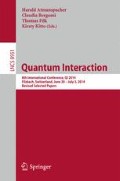Abstract
Quantum-like models can be fruitfully used to model attitude change in a social context. Next steps require data, and higher dimensional models. Here, we discuss an exploratory study that demonstrates an order effect when three question sets about Climate Beliefs, Political Affiliation and Attitudes Towards Science are presented in different orders within a larger study of \(n=533\) subjects. A quantum-like model seems possible, and we propose a new experiment which could be used to test between three possible models for this scenario.
Access this chapter
Tax calculation will be finalised at checkout
Purchases are for personal use only
Notes
- 1.
See http://en.wikipedia.org/wiki/List_of_Australian_federal_elections for the actual margins.
References
Petty, R.E., Wegener, D.T.: Attitude change: multiple roles for persuasion variables. In: Gilbert, D., Fiske, S., Lindzey, G. (eds.) The Handbook of Social Psychology, pp. 323–390. McGraw-Hill, New York (1998)
Seiter, R.H., Gass, J.S.: Persuasion, Social Influence, and Compliance Gaining, 4th edn. Allyn & Bacon, Boston (2010)
Cooper, J.: Cognitive Dissonance: 50 Years of a Classic Theory. Sage, Thousand Oaks (2007)
Bond, R., Smith, P.B.: Culture and conformity. Psychol. Bull. 119, 111–137 (1996)
Greenwald, A.G., Banaji, M.R.: Implicit social cognition: attitudes, self-esteem, and stereotypes. Psychol. Rev. 102, 4–27 (1995)
Boschetti, F., Richert, C., Walker, I., Price, J., Dutra, L.: Assessing attitudes and cognitive styles of stakeholders in environmental projects involving computer modelling. Ecol. Model. 247, 98–111 (2012)
Kahan, D.M., Braman, D., Slovic, P., Gastil, J., Cohen, G.L.: The second national risk and culture study: making sense of - and making progress in - the American culture war of fact. Technical report, Yale Law School (2007). Public Law Working Paper No. 154. SSRN: http://ssrn.com/abstract=1017189 or http://dx.doi.org/10.2139/ssrn.1017189
Lewandowsky, S., Gignac, G.E., Oberauer, K.: The role of conspiracist ideation and worldviews in predicting rejection of science. PLOS ONE 8, e75637 (2013)
Petty, R.E., Cacioppo, J.T.: Communication and Persuasion: Central and Peripheral Routes to Attitude Change. Springer, New York (1986)
Chaiken, S.M.: The heuristic model of persuasion. In: Zanna, P., Olson, J.M., Herman, C.P. (eds.) Social Influence: The Ontario Symposium, vol. 5, pp. 3–39. Erlbaum, Hillsdale (1987)
Tversky, A., Kahneman, D.: The framing of decisions and the psychology of choice. Science 211(4481), 453–458 (1981)
Kitto, K., Boschetti, F., Bruza, P.: The quantum inspired modelling of changing attitudes and self-organising societies. In: Busemeyer, J.R., Dubois, F., Lambert-Mogiliansky, A., Melucci, M. (eds.) QI 2012. LNCS, vol. 7620, pp. 1–12. Springer, Heidelberg (2012)
Kitto, K., Boschetti, F.: The effects of personality in a social context. In: Knauff, M., Pauen, M., Sebanz, N., Wachsmuth, I. (eds.) Proceedings of the 35th Annual Conference of the Cognitive Science Society, pp. 2740–2745. Cognitive Science Society, Austin (2013)
Kitto, K., Boschetti, F.: Attitudes, ideologies and self-organisation: information load minimisation in multi-agent decision making. Adv. Complex Syst. 16(2 & 3), 1350029 (2013)
Costa, P.T., McCrae, R.R.: Normal personality assessment in clinical practice: the neo personality inventory. Psychol. Assess. 4(1), 5–13 (1992)
Gärdenfors, P.: Knowledge in Flux: Modeling the Dynamics of Epistemic States. MIT Press, Cambridge (1988)
Baltag, A., Smets, S.: Correlated knowledge: an epistemic-logic view on quantum entanglement. Int. J. Theor. Phys. 49(12), 3005–3021 (2010)
Blutner, R.: Questions and answers in an orthoalgebraic approach. J. Logic Lang. Inform. 21(3), 237–277 (2012)
Graben, P.B.: Order effects in dynamic semantics. Top. Cogn. Sci. 6(1), 67–73 (2014)
Busemeyer, J., Bruza, P.: Quantum Models of Cognition and Decision. Cambridge University Press, Cambridge (2012)
Wang, Z., Busemeyer, J.R.: A quantum question order model supported by empirical tests of an a priori and precise prediction. Top. Cogn. Sci. 5, 689–710 (2013)
Leviston, Z., Price, J., Malkin, S., McCrea, R.: Fourth annual survey of Australian attitudes to climate change: interim report. Technical report, CSIRO, Perth, Australia (2014)
R Development Core Team: R: A Language and Environment for Statistical Computing. R Foundation for Statistical Computing, Vienna, Austria (2008)
Khrennikov, A.Y.: Ubiquitous Quantum Structure. Springer, Heidelberg (2010)
Acknowledgements
We thank Peter Bruza for his many contributions to early discussions about this work, and the possible use of the QQ model.
Author information
Authors and Affiliations
Corresponding author
Editor information
Editors and Affiliations
Rights and permissions
Copyright information
© 2015 Springer International Publishing Switzerland
About this paper
Cite this paper
Kitto, K., Sonnenburg, L., Boschetti, F., Walker, I. (2015). Modelling Attitudes to Climate Change — An Order Effect and a Test Between Alternatives. In: Atmanspacher, H., Bergomi, C., Filk, T., Kitto, K. (eds) Quantum Interaction. QI 2014. Lecture Notes in Computer Science(), vol 8951. Springer, Cham. https://doi.org/10.1007/978-3-319-15931-7_10
Download citation
DOI: https://doi.org/10.1007/978-3-319-15931-7_10
Published:
Publisher Name: Springer, Cham
Print ISBN: 978-3-319-15930-0
Online ISBN: 978-3-319-15931-7
eBook Packages: Computer ScienceComputer Science (R0)

